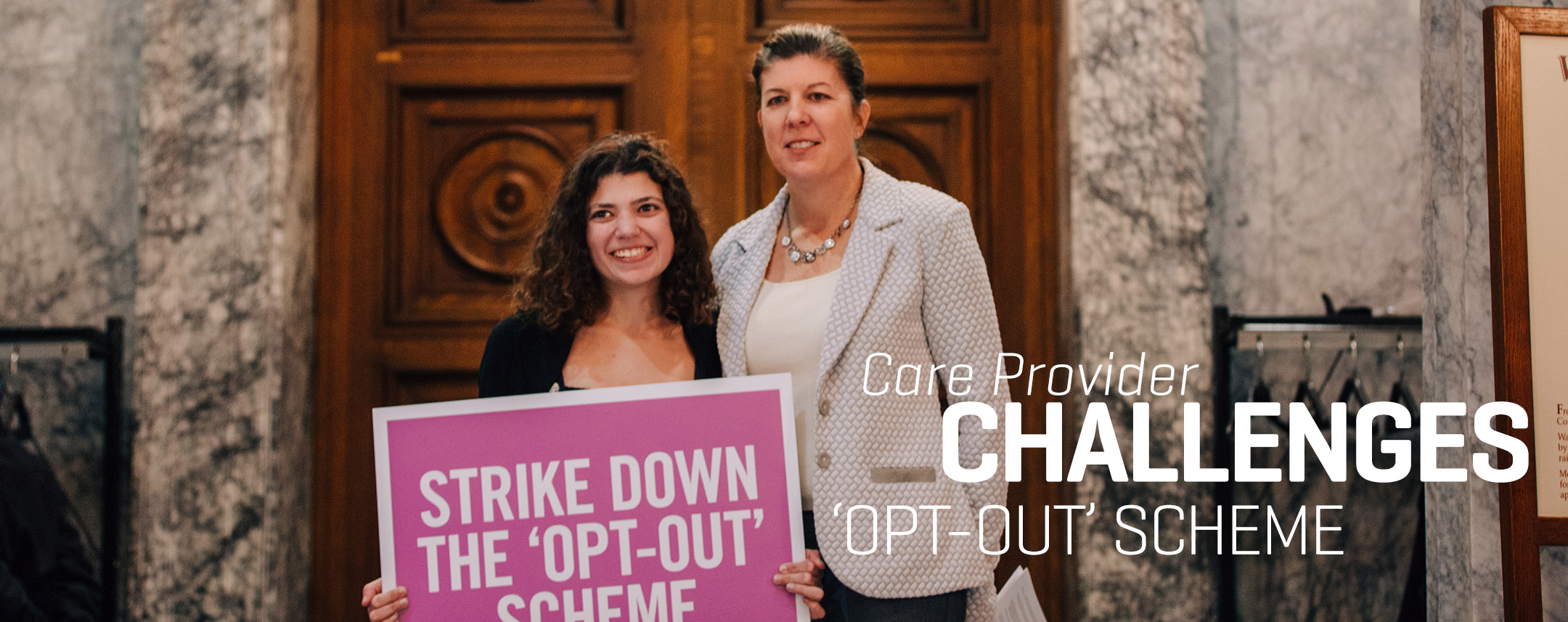What do unions do when their cash flows are challenged by workers’ constitutional rights? They simply find more devious ways to violate those rights.
SEIU 775, the Washington political juggernaut that rakes in tens of millions of dollars in annual dues from care providers earning approximately $11 per hour, made the economically shrewd – yet morally stunted – decision last September to institute scheme by which thousands of workers’ pay union dues automatically unless they’ve gone through the complicated process of formally “opting out.”
The collective bargaining agreements negotiated by SEIU 775 and the state of Washington have always contained “union security” provisions that require every worker covered by the contract to either join or financially support the union if they don’t want to lose their jobs.
For homecare workers, this meant choosing between supporting a union whose ideals they might not share and continuing to receive compensation for the care they provided a loved one.
SEIU 775 was literally permitted to extort union dues from providers for a decade by threatening to remove their financial security.
That changed in June 2014, when the U.S. Supreme Court ruled in Harris v. Quinn that care providers, like those represented by SEIU 775, cannot be forced to financially support a union. SEIU 775 represents more than 30,000 such providers—and that representation generates approximately $25 million in annual dues revenue.
Any other entity, faced with an unequivocal ruling from the Supreme Court decision, would simply have stopped siphoning dues from the thousands of providers who never joined the union or authorized dues deductions. But SEIU 775 doesn’t roll that way.
In predictably calculated and unethical fashion, the union simply altered the dues-capture structure and continued to divert dues from providers’ modest salaries.
Obviously, SEIU was highly motivated to avoid the financial implications associated with actually honoring workers’ rights, so the “opt-out” scheme seemed a desirable alternative. Sadly, the state of Washington was all too abet this scam.
In September, several months after Harris, SEIU 775 and the state convened at the bargaining table to hash out the “uncertainty” wrought by the Supreme Court’s decision. Instead of immediately stopping dues deductions from homecare workers, they agreed to remove the union security provision and replace it with an “opt-out” scheme.
Under this new scheme, the state still seizes full union dues from the payments to every home care provider. But if a provider objects to the union deductions by informing the union by letter, the state and union will permit that provider to cease paying dues.
How gracious of them.
This amended scheme was simply inserted in the now-active CBA that remains in effect until June 2017.
In other words, thousands of providers who never signed membership and payroll deduction authorization forms continue to have dues taken out. The only problem is that the “opt-out” scheme implemented by the state and SEIU 775 plainly violate state law.
RCW 41.56.113(1) states that “Upon the written authorization of an individual provider… the state… shall… deduct from the payments to an individual provider… the monthly amount of dues as certified by the… (union) and shall transmit the same to the… (union).”
Pretty clear, right? The state has to have written authorization from a provider before seizing union deductions from their paychecks.
There is an exception to the written authorization requirement. The law goes on to say that the state can take union fees from providers who have not given written authorization if — and only if — the governing collective bargaining agreement contains a union security provision.
Remember what the state and SEIU 775 explicitly removed from the contract in September 2014? The union security provision.
As of that date — Sept. 26, 2014, to be specific — the law’s general rule applied with no exceptions: The state must get have authorization from every provider before deducting union dues from their paychecks.
But both the state and union have flouted the law. In sworn testimony from March in a federal lawsuit, SEIU 775 Secretary-Treasurer Adam Glickman admitted the state still seizes dues from approximately 6,000 homecare providers who’ve never provided written authorization.
Let’s put this in financial perspective. Each homecare provider is forced to pay about $585 per year to the union. Multiply that by 6,000 non-authorizing providers, and you get a whopping $3.5 million collected each year by illegal means.
Even more important than the money — which is extremely important — state law protects the basic right of homecare providers to make their own decision about union membership and union fees.
That is why Freedom Foundation recently filed suit on behalf of Miranda Thorpe, a homecare provider who cares for her daughter. Miranda also never provided written authorization to the State for union deductions. Yet the state took full union dues from her payments, every month, without her consent.
Miranda’s lawsuit asks the court to declare illegal those portions of the current collective bargaining agreement that direct the state to seize union dues from providers who did not first authorize those deductions in writing.
When the state of Washington is willing to break the law and enter an illegal agreement in order to shield SEIU 775 from the “undesirable” results of homecare providers’ constitutional rights, someone has to stand up and demand better.
That’s why we’re proud to represent Miranda in her effort to force the State to stop facilitating this plainly illegal “opt-out” scheme.











